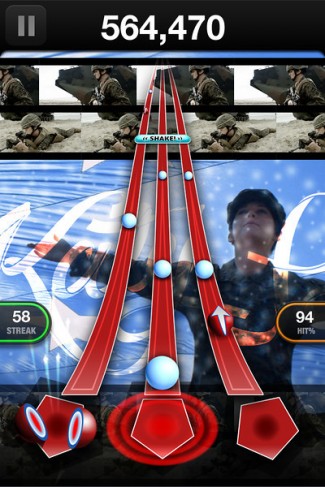Bastion
LQ: 9.15
Recommended Age: 10+
Skills Used: Planning, Working Memory, Mathematics, Reading

In Tap Tap Revenge Tour, players tap along to the beat of popular pop and rock songs, with a new free track being released for the game daily. Players use the touch screen to tap and swipe in time with the music, and must follow visual cues that instruct them when and where to touch screen. These cues are represented by colored icons that move down toward the bottom of the screen — each representing a note in the song — which players must tap and swipe when they reach the bottom. Tap Tap Revenge Tour also features various levels of difficulty, which players can take on to further challenge their skills. The game features no inappropriate content and is easy to learn, but parents should monitor use, as many popular songs must be bought through the app in order to be played, and some songs can contain inappropriate content. Due to the simple controls and ease of play, the game is recommended to players 8 and up.
Teachers: check out the classroom guide!
Getting started and then maintaining attention and effort to tasks. Ignoring external distractions.
 Tap Tap Revenge helps kids practice their Focus skills asking them with following along with a beat throughout the entire duration of a song. Tapping at the right moment and learning a rhythm takes keen concentration. Players must observe note patterns and spacing to discern when to time taps, listening along with the song for the musical cues. If players fail to remain alert and attentive, they could mistime their taps, which can drop the overall score, and -- even done repeatedly -- ends the game. Each level requires a certain percentage of perfect taps players need to achieve, so remaining focused on the beat is key to advancing.
Tap Tap Revenge helps kids practice their Focus skills asking them with following along with a beat throughout the entire duration of a song. Tapping at the right moment and learning a rhythm takes keen concentration. Players must observe note patterns and spacing to discern when to time taps, listening along with the song for the musical cues. If players fail to remain alert and attentive, they could mistime their taps, which can drop the overall score, and -- even done repeatedly -- ends the game. Each level requires a certain percentage of perfect taps players need to achieve, so remaining focused on the beat is key to advancing.
Recalling and retaining information in mind while working.
Players likely won't hit every note on their first attempt, but as they retry the song, they'll begin to learn the timing and patterns for each specific part, using their Working Memory skills to anticipate changes in the music and the correct taps and gestures needed to hit each note. Songs in the game are usually broken up into slower paced easier parts, and a few more difficult segments made up of more challenging patterns. Knowing when each segments occurs is crucial to avoiding costly mistakes. Learning the ins and outs of each song, and then recalling this information while playing allows players to avoid costly mistakes and maximize their score. Players who exercise poor Working memory skill will struggle to keep up, and may even "fail" a song and be forced to start again.
Use this PlayTogether guide to learn how you can help your child turn Tap Tap Revenge 3 play time into a positive learning and relationship-building experience. To learn more about why playing games with your children is so important, check out our Science of Play page.
Take a minute to talk with your child about how the Focus and Working Memory thinking skill works, and why it is important for success in school and at home.
 Tap Tap Revenge Tour has both a single player and multiplayer version for parents to enjoy with their children by comparing scores and trying to achieve the best score possible. Single player versions of the same still save scores for later comparison and ranking with other players all over the world or at home with other members of the family. Try playing Tap Tap Revenge together with your child and accomplishing the gameplay goals listed below.
Tap Tap Revenge Tour has both a single player and multiplayer version for parents to enjoy with their children by comparing scores and trying to achieve the best score possible. Single player versions of the same still save scores for later comparison and ranking with other players all over the world or at home with other members of the family. Try playing Tap Tap Revenge together with your child and accomplishing the gameplay goals listed below.
Gameplay Goals:
After you've completed the goals, take a moment to discuss the importance of the thinking skills at play with your child.
Our Make it Real activites are designed to transform your child’s gameplay to real-world improvements in thinking and academic skills. If you’re just getting started with LearningWorks for Kids, we suggest you try them all to find which are the best for you and your child.
Read over the pages for Focus and Self-Awareness. Then take some time to introduce this thinking skill to your child.
Explain that:
 Be environmentally conscious. It is extremely important to be aware and to urge your child to be aware of settings that help to best sustain attention. Each person is unique and situations vary depending upon time of day, energy level and the nature of the task at hand. But generally, many children with attention problems do well with modest levels of “white noise” or soft background music, or another person nearby but engaged in a separate task. Many find it helpful to eliminate as many distractions as possible (computer screen, television, conversations, toys) and to have the materials they need right in front of them with perhaps a manipulative such as a squeeze ball or a trinket. Once you and your child have considered and thought about what works, strongly encourage her to create these setting on her own both at home and school.
Be environmentally conscious. It is extremely important to be aware and to urge your child to be aware of settings that help to best sustain attention. Each person is unique and situations vary depending upon time of day, energy level and the nature of the task at hand. But generally, many children with attention problems do well with modest levels of “white noise” or soft background music, or another person nearby but engaged in a separate task. Many find it helpful to eliminate as many distractions as possible (computer screen, television, conversations, toys) and to have the materials they need right in front of them with perhaps a manipulative such as a squeeze ball or a trinket. Once you and your child have considered and thought about what works, strongly encourage her to create these setting on her own both at home and school.
Strategies used to help with reading comprehension can also help with working memory concerns. Help children to preview the steps needed to complete basic tasks such as getting ready for bed. Encourage them to predict what will happen if they miss a step. Then help them connect what they need to do with their previous knowledge of accomplishing these tasks. Ask them to paraphrase and summarize directions you have just given. Each of these techniques reflect some of the strategies that are often used with diverse learners to teach them how to use their previous memories and establish thinking skills to guide and direct their behaviors. If you are thinking about these strategies in regard to improving memory, you might also want to talk to your child’s classroom or resource teacher for more ideas about ways to try them.
 Children with ADHD struggle maintaining a keen focus, harnessing impulsivity, and closely following directions. The result is often an inability to complete assignments from start to finish, due to the allure of outside stimuli. Tap Tap Revenge Tour is a great game for children with ADHD. Children must demonstrate constant focus, avoiding the compulsion to avert their gaze from the task. By failing to follow the on-screen prompts, or literally, "marching to the beat of a different drum," children will play the songs at a very low percentage rate.
Children with ADHD struggle maintaining a keen focus, harnessing impulsivity, and closely following directions. The result is often an inability to complete assignments from start to finish, due to the allure of outside stimuli. Tap Tap Revenge Tour is a great game for children with ADHD. Children must demonstrate constant focus, avoiding the compulsion to avert their gaze from the task. By failing to follow the on-screen prompts, or literally, "marching to the beat of a different drum," children will play the songs at a very low percentage rate.
How to Use Tap Tap Revenege Tour for Children with ADHD:
All membership plans come with full access to our entire suite of tools learning guides, and resources. Here are a few of the ones we think you’ll like the most: